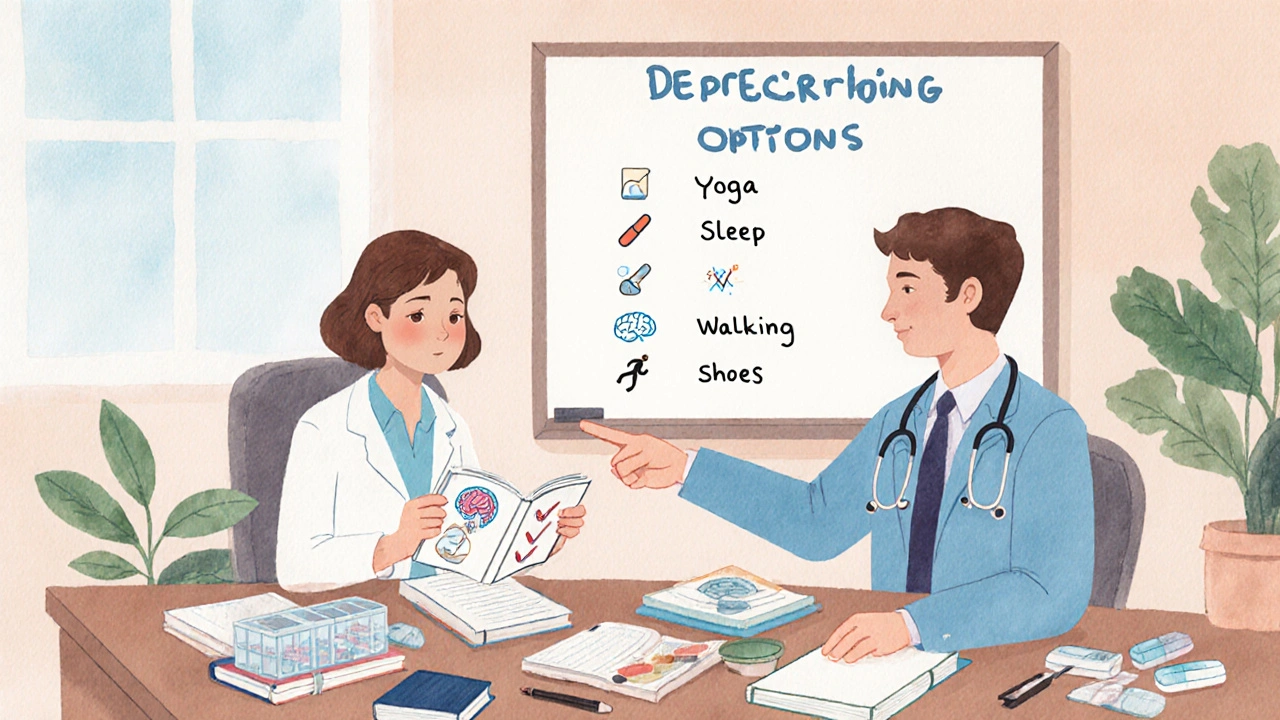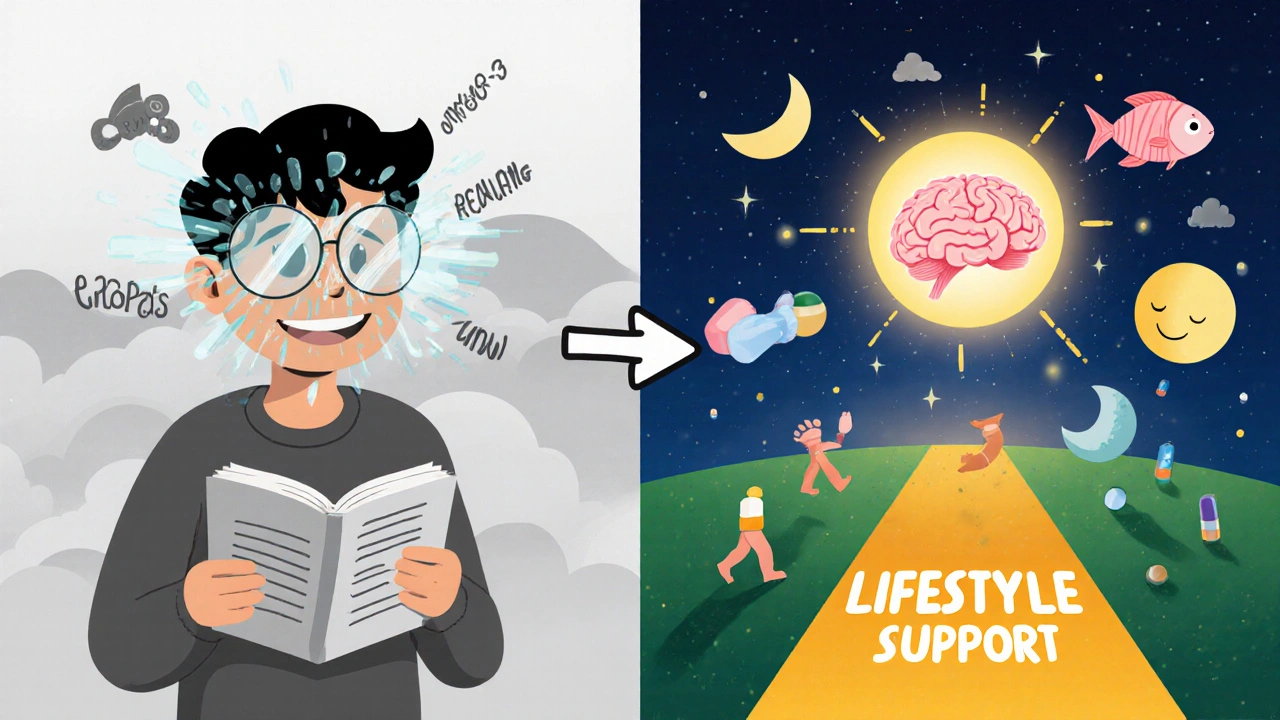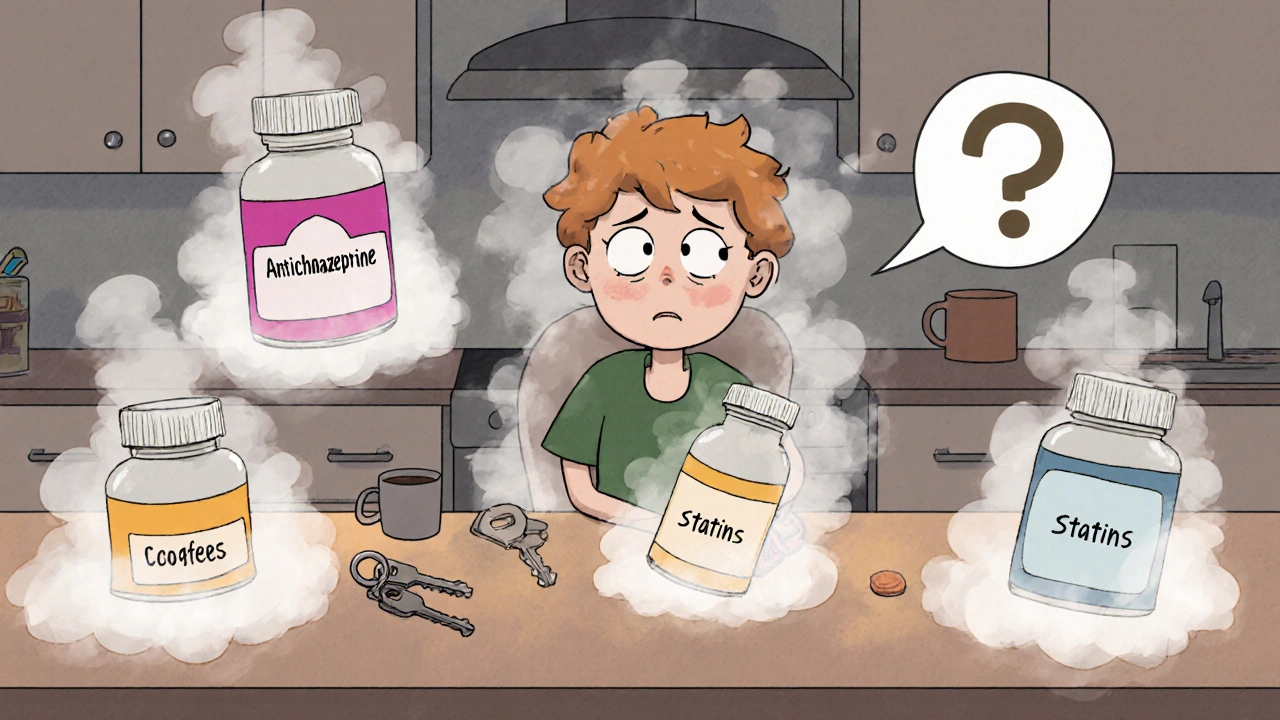It’s not just aging or stress that can make you forget where you put your keys or struggle to concentrate at work. Many common medications - some prescribed, some over-the-counter - quietly mess with your memory and focus. You might not connect your mental fog to that pill you’ve been taking for months. But the link is real, and it’s more common than you think.
What’s Really Going On in Your Brain?
Your brain runs on a delicate balance of chemicals. Neurotransmitters like acetylcholine, dopamine, and serotonin help you form memories, stay alert, and switch between tasks. When a medication interferes with these signals, even slightly, it can cause noticeable changes. This isn’t rare. A 2023 study in the Journal of the American Geriatrics Society found that nearly 40% of adults over 65 taking five or more medications reported memory lapses they blamed on aging - but nearly half of those cases were tied directly to drug side effects.
It’s not just older adults. Younger people on long-term antidepressants, ADHD meds, or even allergy pills are reporting similar issues. The problem? Most doctors don’t ask about brain fog unless you bring it up. And if you’re taking something for anxiety or sleep, you might assume the tiredness is just part of the condition.
Common Medications That Blur Your Focus
Here are the top offenders - the ones you’re most likely to be taking without realizing they’re slowing you down.
- Benzodiazepines (like diazepam, alprazolam): Used for anxiety and insomnia, these drugs boost GABA, a calming brain chemical. The trade-off? They blunt attention, slow reaction time, and disrupt short-term memory formation. Even low doses taken nightly can cause next-day grogginess and trouble recalling conversations.
- Anticholinergics (like diphenhydramine, oxybutynin): Found in sleep aids, allergy pills, and bladder medications, these block acetylcholine - the key neurotransmitter for learning and memory. A 2019 study linked long-term use to a 54% higher risk of dementia in older adults. And yes, Benadryl counts.
- Antidepressants (especially SSRIs like sertraline and SNRIs like venlafaxine): While they help mood, many people report mental sluggishness, word-finding trouble, and reduced motivation. It’s not depression returning - it’s the medication’s side effect. Some patients say they feel "emotionally flat" or like their thoughts are underwater.
- Statins (like atorvastatin, simvastatin): Cholesterol-lowering drugs linked in multiple studies to memory complaints. The mechanism isn’t fully understood, but it may involve reduced cholesterol in brain cell membranes or lower levels of coenzyme Q10. Some patients report clearer thinking after switching statins or stopping them under medical supervision.
- Antiepileptics (like gabapentin, topiramate): Used for seizures, nerve pain, and even migraines, these drugs can cause significant brain fog. Topiramate, in particular, is notorious for making people forget words or feel mentally slow. One patient described it as "trying to think through thick glass."
- Opioids (like oxycodone, hydrocodone): Even short-term use can impair attention and working memory. Long-term use is linked to structural brain changes in areas tied to decision-making and recall.
What About ADHD and Nootropic Drugs?
It’s easy to assume stimulants like Adderall or Ritalin always improve focus - and for many, they do. But they’re not magic. In people without ADHD, these drugs can cause overstimulation, anxiety, and paradoxically, worse concentration. They also disrupt sleep, which tanks memory consolidation. And if you’re taking them long-term without medical oversight, tolerance builds - meaning you need more to get the same effect, increasing side effects.
Over-the-counter "nootropics" like modafinil or racetams are marketed as brain boosters. But they’re not regulated like prescription drugs. Some users report headaches, irritability, and disrupted sleep. There’s little solid evidence they help healthy people think better - and plenty of anecdotal reports of rebound brain fog after stopping.

How to Tell If It’s the Medication - Not You
Brain fog from meds doesn’t feel like normal forgetfulness. Here’s how to spot the difference:
- You noticed the change shortly after starting or increasing a dose.
- It’s worse at certain times of day - like after taking your morning pill.
- You’re forgetting recent events, not distant ones. (Forgetting your 10th birthday? Probably not the pill. Forgetting what you had for breakfast? Maybe.)
- You feel mentally slower across the board - not just in one area like names or numbers.
- Other people notice you’re not yourself.
Keep a simple log for two weeks: note what you took, when, and how sharp or fuzzy your thinking felt. Bring it to your doctor. Don’t guess. Don’t stop cold turkey. Just track.
What to Do If You Suspect a Culprit
Never stop a prescribed medication on your own. But do speak up. Here’s how to have the conversation:
- Bring your symptom log. Be specific: "Since I started taking X, I’ve struggled to follow meetings and forget names I just heard."
- Ask: "Could this be a side effect? Are there alternatives?"
- Request a medication review. Ask for a "deprescribing" discussion - especially if you’re on five or more drugs.
- Ask about timing. Sometimes switching from nighttime to morning dosing helps. Or splitting doses.
- Consider non-drug options. For sleep, try CBT-I. For anxiety, therapy or exercise. For bladder issues, pelvic floor rehab.
Some switches work wonders. One patient switched from diphenhydramine to a nasal spray for allergies - her brain fog lifted in three days. Another replaced gabapentin with pregabalin and regained her ability to read full articles again.

When to Worry - Red Flags
Not all memory issues are drug-related. Seek urgent evaluation if you also have:
- Sudden confusion or disorientation
- Difficulty speaking or understanding speech
- Loss of coordination or balance
- Personality changes or hallucinations
- Memory loss that interferes with daily tasks (paying bills, taking meds correctly)
These could signal something more serious - stroke, thyroid disorder, vitamin B12 deficiency, or early dementia. A simple blood test can rule out many of these.
Protecting Your Brain While Taking Meds
If you need to stay on a medication that affects cognition, here’s how to minimize the damage:
- Get your vitamin B12, D, and folate levels checked. Low levels make brain fog worse.
- Move daily. Even 20 minutes of walking boosts blood flow to the brain and helps clear toxins.
- Sleep 7-8 hours. Memory consolidation happens during deep sleep - no pill can replace that.
- Limit alcohol. It multiplies the brain-slowing effects of many drugs.
- Try cognitive training. Apps like Lumosity or even crossword puzzles help build mental resilience.
Some people swear by omega-3s or phosphatidylserine supplements. The evidence is mixed, but they’re generally safe. Always check with your doctor first - especially if you’re on blood thinners or antidepressants.
The Bottom Line
Medications that affect memory and focus aren’t outliers - they’re widespread. The real danger isn’t the drugs themselves. It’s the silence around them. We accept brain fog as normal. We blame stress. We take more pills to fix the side effects of other pills.
But your brain isn’t meant to be clouded. If you’ve been feeling off - not just tired, but mentally dull - it’s worth asking: Is this me? Or is this the medication?
Take back control. Track your symptoms. Talk to your doctor. There’s almost always a better way - and your focus is worth fighting for.
Can over-the-counter allergy meds really affect memory?
Yes. Many OTC allergy and sleep aids contain diphenhydramine or doxylamine - both are anticholinergics. These drugs block acetylcholine, a key chemical for memory and attention. Studies show long-term use increases dementia risk. Even occasional use can cause daytime drowsiness and trouble concentrating. Look for non-sedating options like loratadine or cetirizine instead.
Do antidepressants make you dumber?
Not permanently, but many people report mental sluggishness, word-finding issues, or emotional blunting - especially early on. This is often temporary, lasting weeks to months. If it persists, your doctor might adjust the dose, switch to a different class (like bupropion, which tends to be less sedating), or add therapy. It’s not about being "dumber" - it’s about the medication’s effect on neurotransmitters. The goal is balance, not numbness.
Can statins cause memory loss?
Some people report memory lapses after starting statins, and the FDA has acknowledged this as a possible side effect. Research is mixed - some studies show no link, others show subtle changes in recall. The effect, if real, is usually mild and reversible. If you notice brain fog after starting a statin, talk to your doctor. Switching to a different statin or lowering the dose often helps. Never stop without medical advice - the heart benefits are significant.
Is it safe to stop a medication that’s causing brain fog?
Never stop abruptly, especially with antidepressants, benzodiazepines, or blood pressure meds. Sudden withdrawal can cause rebound symptoms, seizures, or dangerous spikes in blood pressure. Always work with your doctor. They can help you taper slowly, monitor for withdrawal, and switch to a safer alternative. Your brain will thank you for the careful approach.
Can lifestyle changes help reverse medication-related brain fog?
Absolutely. Exercise increases BDNF, a protein that supports brain cell health. Sleep lets your brain clear out toxins linked to cognitive decline. A Mediterranean-style diet rich in vegetables, fish, and olive oil reduces inflammation that worsens brain fog. Reducing alcohol and managing stress also help. These don’t replace medical advice - but they give your brain the best chance to recover while you adjust meds.

